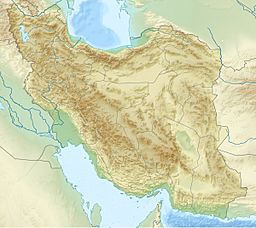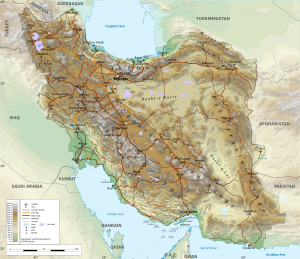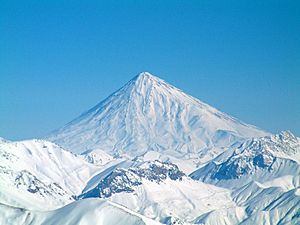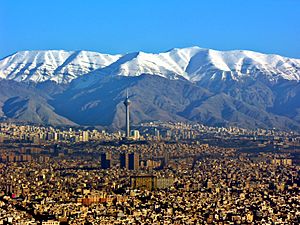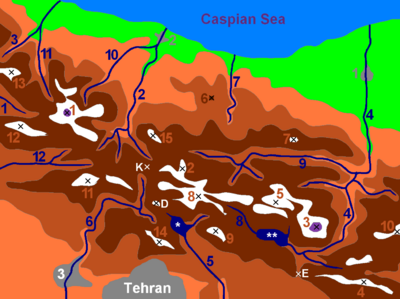Alborz facts for kids
Quick facts for kids Alborz |
|
|---|---|
| Highest point |
The Alborz ( Persian: البرز) is a major mountain range in northern Iran. It stretches from the border of Azerbaijan all the way along the southern coast of the Caspian Sea. It then turns northeast and joins other smaller mountains.
These mountains are part of a much larger chain called the Alpide belt. The Alborz range is split into three main parts: Western, Central, and Eastern. Mount Damavand, the highest mountain in Iran, stands tall at 5,610 meters (18,405 feet). It is located in the Central Alborz Mountains. Damavand is also one of the most prominent peaks in the world.
Contents
What's in a Name? The Meaning of Alborz
The name Alborz comes from an old legend. It is linked to Harā Barazaitī, a mythical mountain from the Avesta. This is a very old religious text of Zoroastrianism.
Harā Barazaitī means "Mountain Rampart" in an ancient Iranian language. The word Barazaitī means "high." Harā might mean "watch" or "guard." This name is also related to Mount Elbrus, the highest peak in the Caucasus mountains.
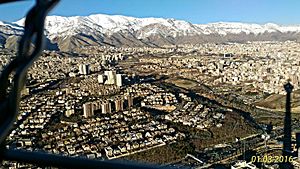
Ancient Stories and Legends
In Zoroastrianism, some people believe the Alborz range is a special dwelling place. The famous poet Ferdowsi wrote about these mountains in his epic poem, the Shahnameh.
He described them as very important and legendary. Many high peaks were given names similar to Alborz. This shows how significant these mountains were in ancient stories.
How the Mountains Formed: A Look at Geology
The Alborz mountain range acts like a natural wall. It separates the humid area near the Caspian Sea from the dry Iranian plateau. These mountains are about 60 to 130 kilometers wide.
They are mostly made of layers of rock that formed over millions of years. These rocks include limestone and sandstone. The mountains were created when huge land plates collided. The Arabian Plate pushed against the Iranian Plate. This caused the Earth's crust to fold and uplift. This process formed the tall peaks we see today.
Nature's Beauty: Plants and Animals
The Alborz Mountains have two very different sides. The southern slopes are quite dry. They get little rain and have fewer trees. Here, you might see juniper trees in high places. Other common plants include pistachio, maple, and almond shrubs.
However, the northern slopes are very green and wet. This area is home to the Caspian Hyrcanian mixed forests. These forests are incredibly lush. They have different zones of plants:
Many amazing animals live here. You can find the bezoar ibex (a type of wild goat) and different kinds of foxes. There are also wild boars, Syrian brown bears, and the rare Persian leopard. Birds like buzzards, geese, and eagles fly overhead. Sadly, the Caspian tiger used to live here but is now extinct.
Ancient Human History
Evidence shows that people have lived in the Alborz region for a very long time. Archaeologists have found tools and animal bones in places like the Darband Cave. These findings suggest that early humans were present here thousands of years ago.
During the Middle Paleolithic period, Neanderthals likely lived in this area. Their stone tools have been found in several caves. Later, modern humans arrived. Evidence from a site called Garm Rud shows human presence from about 30,000 years ago.
Fun in the Snow: Ski Resorts
The Alborz Mountains get a lot of snow in winter. This makes them perfect for ski resorts. Some of these resorts are considered among the best in the world by ski lovers.
Popular ski resorts in the Alborz range include Dizin, Shemshak, Tochal, and Darbandsar. They offer great slopes for skiing and snowboarding.
Famous Peaks and Attractions
The Alborz Mountains are home to many impressive peaks. Besides Mount Damavand, other notable mountains include Alam-Kuh and Azad Kuh.
Some popular attractions in the Alborz region are:
- Mount Damavand
- Tochal mount and summit
- Tangeh Savashi, a popular natural attraction
- Alamut, a historic fortress area
- Dizin, a famous ski resort
- Ovan lake, a beautiful alpine lake
| Map of central Alborz | Peaks: | 1 Alam-Kuh |
|---|---|---|
| 2 Azad Kuh | 3 Damavand | |
| 4 Do Berar | 5 Do Khaharan | |
| 6 Ghal'eh Gardan | 7 Gorg | |
| 8 Kholeno | 9 Mehr Chal | |
| 10 Mishineh Marg | 11 Naz | |
| 12 Shah Alborz | 13 Sialan | |
| 14 Tochal | 15 Varavašt | |
| Rivers: | 0 | |
| 1 Alamut | 2 Chalus | |
| 3 Do Hezar | 4 Haraz | |
| 5 Jajrood | 6 Karaj | |
| 7 Kojoor | 8 Lar | |
| 9 Noor | 10 Sardab | |
| 11 Seh Hazar | 12 Shahrood | |
| Cities: | 1 Amol | |
| 2 Chalus | 3 Karaj | |
| Other: | D Dizin | |
| E Emamzadeh Hashem | K Kandovan Tunnel | |
| * Latyan Dam | ** Lar Dam |
See also
 In Spanish: Montes Elburz para niños
In Spanish: Montes Elburz para niños
- List of Iranian four-thousanders
- List of mountains in Iran
- Kayanian dynasty
- Koh e Alborz
 | Calvin Brent |
 | Walter T. Bailey |
 | Martha Cassell Thompson |
 | Alberta Jeannette Cassell |


